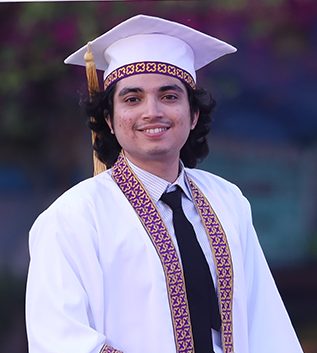
HASHIM ABBAS RIZVI
Aspiration Statement
I want to pursue my interest in robotics and programmable matter and eventually create robots that can autonomously create any object on the macro-scale and the nano-scale. I am inclined towards creative and innovative product development and my future goal is to become a technological entrepreneur.
Core Skills
- Python, C++
- MATLAB
- Digital 3D Models using CAD software's
- Qualitative, Quantitative and Technical Research
- ROS and Gazebo Simulator on Linux
Academic Awards / Achievements
- Dean's List Spring 2018
- Dean's List Spring 2019
- Dean's List Fall 2020
- Attended the Taqadam Leadership/Co-Curricular Conference at Qatar University, Doha, Qatar in November 2018
Experience
Leadership / Meta-curricular
- Habib University Student Government (2017-18) - General Secretary
- A Very Desi Potter Musical (2019-2020) - Director & Lead Actor
- Joy of Electronics - HU Splash (July 2019) - Course Instructor & Designer
- New Student Orientation (August 2018) - Orientation Leader
Internship / Volunteer Work
- HU Marcomm - Digital Communications Associate
- Habib University DSSE Research Assistant for NRPU - Flowmeter Project
Publications / Creative Projects
- Directed a three-hour comedy musical - A Very Desi Potter Musical - at Habib University in January 2020
Final Year Project
Project Title
Morph Bots
Description
Swarm robotics' potential to support human existence– be it through their ability to survive in environments that are unsuitable for humans; replicating objects and patterns through swarm collaboration; their flexibility, adaptability, and potential to be used for a vast array of applications; debris removing is immense. Morph Bots is an autonomous group of swarm robots that act as individual display units that can link up with each other in order to create a larger 3-D model. This physical representation will be a replication of the 3-D digital model that will be provided to the system. This project provides a framework for other researchers to build upon and modify this design to create better and more realistic 3-D models using robots. It is a simplistic implementation of programmable matter, tackling the idea of autonomous material building without human intervention. Serves as a 3-D prototyping tool for digital designers who create digital 3-D models of parts.